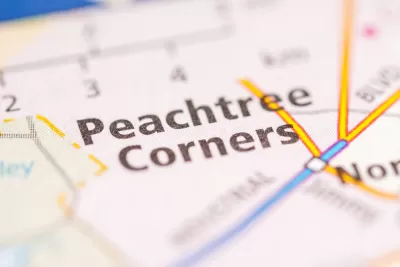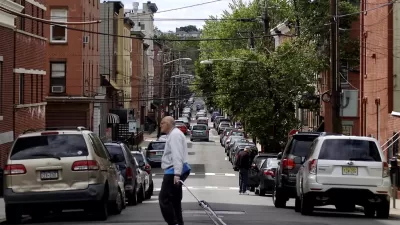Peachtree Corners is putting the ‘smart city’ model into practice, taking a methodical approach to introducing new technology and autonomous devices.

A small Atlanta suburb is rapidly becoming a model for the much-discussed ‘smart city,’ but the city may look less futuristic than you imagine, writes Mohar Chatterjee in Politico.
“The 45,000-person city is home to an unusual public innovation experiment. Peachtree Corners’ chief technology officer, who also happens to be the assistant city manager, runs an incubator called Curiosity Lab, which invites private firms to come test out their prototypes in a 500-acre public space called Technology Park Atlanta.” The concept recalls Walt Disney’s goal for E.P.C.O.T. and Larry Page’s idea for the smart city Sidewalk Labs would build: a living community as an innovation lab for new inventions and technology.
With the new technology, Peachtree will also have to navigate the new waters of data privacy and safety. “It’s the kind of place entrepreneurs and civic leaders will need to reckon with as they make their next round of high-tech promises.” The city is proceeding cautiously. For example, “Right now, Peachtree Corners has gone as far as any American city in integrating self-driving vehicles — but the city’s autonomous shuttles still run only in dedicated lanes.”
The city is using the strictest federal standards for data privacy as it encourages home builders in the community to install data-gathering devices. “[Chief Technology Officer and deputy city manager Brandon Branham] said he is aware of the ‘fine balance’ between ensuring data privacy and having a better operational base to deploy citywide IoT technologies.”
FULL STORY: What smart cities actually need

Trump Administration Could Effectively End Housing Voucher Program
Federal officials are eyeing major cuts to the Section 8 program that helps millions of low-income households pay rent.

Planetizen Federal Action Tracker
A weekly monitor of how Trump’s orders and actions are impacting planners and planning in America.

Ken Jennings Launches Transit Web Series
The Jeopardy champ wants you to ride public transit.

Crime Continues to Drop on Philly, San Francisco Transit Systems
SEPTA and BART both saw significant declines in violent crime in the first quarter of 2025.

How South LA Green Spaces Power Community Health and Hope
Green spaces like South L.A. Wetlands Park are helping South Los Angeles residents promote healthy lifestyles, build community, and advocate for improvements that reflect local needs in historically underserved neighborhoods.

Sacramento Plans ‘Quick-Build’ Road Safety Projects
The city wants to accelerate small-scale safety improvements that use low-cost equipment to make an impact at dangerous intersections.
Urban Design for Planners 1: Software Tools
This six-course series explores essential urban design concepts using open source software and equips planners with the tools they need to participate fully in the urban design process.
Planning for Universal Design
Learn the tools for implementing Universal Design in planning regulations.
Heyer Gruel & Associates PA
Ada County Highway District
Institute for Housing and Urban Development Studies (IHS)
City of Grandview
Harvard GSD Executive Education
Toledo-Lucas County Plan Commissions
Salt Lake City
NYU Wagner Graduate School of Public Service





























